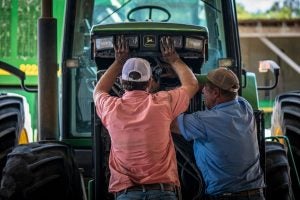Equipment breakdowns are a fact of life for farmers across the country. But manufacturer-imposed repair restrictions make these malfunctions even more painful by forcing farmers to rely on their dealership for many fixes — even ones they could perform themselves with the proper information, tools, and software access.
Michigan’s House Agriculture Committee Chair Reggie Miller introduced new legislation allowing farmers to repair their equipment, taking the recent Memorandum of Understanding signed by equipment manufacturers and the American Farm Bureau a step further.
House Bill 4673 (aka the Agriculture Equipment Repair Act) requires certain original equipment manufacturers and repair providers of agricultural equipment to make diagnostic, maintenance, and repair parts, tools, and documentation available to independent repair providers and equipment owners — and even more so, to provide remedies.
Under HB 4673, tractors, trailers, combines, sprayers, tillage equipment, baler, or other personal property, including the digital electronics embedded or attached to the equipment being used on a farm or ranch are included.
Michigan Farmers Union President Bob Thompson says his organization supports the legislation.

“We want to make sure that those that do have the expertise, knowledge, and ability have the proper tools and software in order to actually make the repairs where they can,” he said.
As things currently stand in many states, an owner of agricultural equipment must seek diagnostic, maintenance, or repair services of the equipment from the agricultural equipment manufacturer.
Earlier this year, Colorado lawmakers became the first to sign a Consumer Right to Repair Agriculture Equipment Act.
Colorado’s bill goes into effect January 1, 2024, requiring manufacturers to provide parts, embedded software, firmware, tools, manuals, or other information necessary to conduct diagnostic, maintenance, or repair services on the owner’s agricultural equipment.
The bill works by folding agricultural equipment into pre-existing consumer right-to-repair statutes. While it does protect farmers from unnecessary expenditures or downtime with their equipment, it doesn’t allow for unauthorized modifications that affect safety or emissions compliance. It also does not allow for “any conduct that would evade emissions, copyright, trademark, or patent laws.”
A report released by the nonprofit U.S. PIRG Education Fund on Tuesday estimates that U.S. farmers lose $3 billion to tractor downtime and pay an additional $1.2 billion in excess repair costs each year.


